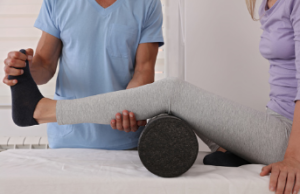Susan’s personalised exercise program includes aerobic exercises, strength training, balance and flexibility exercises. These help her improve her mobility, stability and overall quality of life.
Kahlia grew up locally and understands the demands of managing musculoskeletal injuries in a regional setting. She is passionate about helping her clients achieve their movement goals pain-free. For professional exercise physio for seniors Beverley services, click here.
Strength Training
 Strength training, or resistance or weight training, challenges your muscles with a stronger-than-usual counterforce. It strengthens muscles, tones them, and increases bone density. It also improves balance and coordination and helps prevent falls. You can do strength training using your body weight — such as pushups, lunges, and squats — or free weights, such as dumbbells or barbells. You can also use tools that provide resistance when stretched, such as resistance tubing, available at most sporting goods stores.
Strength training, or resistance or weight training, challenges your muscles with a stronger-than-usual counterforce. It strengthens muscles, tones them, and increases bone density. It also improves balance and coordination and helps prevent falls. You can do strength training using your body weight — such as pushups, lunges, and squats — or free weights, such as dumbbells or barbells. You can also use tools that provide resistance when stretched, such as resistance tubing, available at most sporting goods stores.
With the help of exercise physiologists, seniors can experience improved physical fitness, cognitive function, emotional well-being and overall independence at home. Physiotherapists can create and monitor exercise programs that help seniors build strength, flexibility and balance to perform daily activities. These programs consider each senior’s health and fitness level, medical history, and specific limitations. They can also help them get motivated and stay on track with their fitness goals. Achieving these goals can boost a senior’s confidence in participating in healthy lifestyle practices.
Aerobic Exercises
Aerobic exercise gets the heart pumping, which helps improve circulation and boosts the body’s metabolism. It can also help lift mood and increase self-confidence. Examples of aerobic activity include walking, swimming, dancing, cycling, jogging and using an elliptical trainer. For professional exercise physio for seniors Beverley services, click here.
The HHS recommends adults get 150 to 300 minutes of moderate-intensity or 75 to 150 minutes of vigorous-intensity aerobic physical activity each week. They should also perform muscle-strengthening workouts that target major muscle groups at least two days each week.
After conducting an assessment, the exercise physiologist created a personalised aerobic exercise program for Susan. The program includes cardiovascular and balance exercises to help her regain strength, flexibility and stability. Over time, Susan noticed significant improvements in her mobility and quality of life. Her increased strength and endurance make everyday activities more accessible and less tiring. Her balance improves, which reduces her fear of falling. Her mood and energy levels boost as she achieves her goals.
Balance Exercises
Balance training is necessary for a healthy fitness routine and helps reduce falls. It consists of exercises that improve posture and stability over a base of support, such as squatting or standing on one leg. Balance exercises can be simple, like standing on the right or left foot for 10 seconds, or more complex, such as a single-leg heel lift. Ideally, people at risk of falling should work on balance training three or more times per week.
To perform a simple balance exercise, stand with your back to a wall and slowly shift your weight to the side. It will feel challenging initially, but it can be improved by increasing the difficulty. The following exercise involves a quick saving step, which you must do to catch yourself if you lose your balance while walking. These can be done while your eyes are closed, but be sure to have someone monitor you. For professional exercise physio for seniors Beverley services, click here.
Flexibility Exercises
Flexibility exercises include activities that systematically stretch your muscles until they’re loosened up and more supple. Although these exercises won’t improve your strength or endurance, they give you more freedom of movement and help you avoid muscle discomfort when your body is confined for extended periods (such as during a long plane flight or meeting).
Falling is a major cause of injury for the elderly and can be extremely dangerous. Improving balance and stability can help avoid falling by making it easier to move around. A physical therapist can recommend specific exercises that will improve balance, including standing on one foot, heel-to-toe walking and balancing a stick in each hand.
